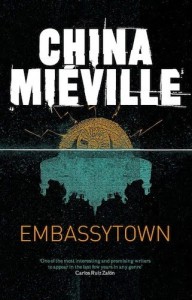Embassytown by China Miéville
(MacMillan, 2011, HB, £17.99, out now)
A criticism often levelled at science-fiction novels is that they’re full of great ideas, but short on story-telling. It’s to China Miéville’s credit, then, that no matter how outlandish the worlds, cultures and artifacts he creates in his books, they always seem to occupy a meaningful place in his absorbing plots. Embassytown is no exception, and in fact can be seen as a masterclass in how to make a complex sci-fi invention absolutely central to the development and resolution of a story, rather than just decorating the backdrop to it.
Concepts like hyperspace travel and crises of alien diplomacy are old hat in the world of science-fiction, but to these familiar tropes Miéville adds a refreshingly original and cerebral take on xenolinguistics, or alien language. On the distant port planet of Arieka, human settlers maintain a peaceful co-existence with the enigmatic natives, truly bizarre alien creatures, the quirks of whose near-impenetrable and peculiar language mean that they are unable to lie. The human colonists can only communicate with their so-called “Hosts” through genetically-engineered ambassadors, whose enhancements enable them to mimick the exotic speech of the locals. The arrival of a new ambassador, unlike any who have gone before, heralds a breakdown in communication and an increasingly desperate situation for the humans now stranded on the very edge of known space.
Like much of Miéville’s work this book is rich with themes, some made obviously explicit and others less so. The use and abuse of language is of course central to the story, as well as its dangerous potential to mislead, confuse and intoxicate – both literally and metaphorically. The progress of linguistic breakdown in the book actually runs parallel with the gradual humanization of the main characters, many of whom begin the story as distant, unsympathethic creations but grow into fully-formed, relatable human beings by the conclusion of the book. This I believe is a deliberate ploy on the part of Miéville, who wishes to show us that traditional structures of language can be as much of a barrier between people as a tool for communication. If we look deeper, we can also discern a more general political theme running through Embassytown, that of the often destructive influence of colonising powers on the indigenous societies they disturb, and of the violent retribution that unchecked hubris can provoke.
One of Miéville’s greatest strengths as a writer is to keep such themes, potent though they are, from getting in the way of telling a good story. Though the book – much like its characters – initially seems to be holding you at arm’s length, it isn’t long before the varied strands of the tale begin to coalesce into a gripping narrative. The truly thrilling thing is to see how the author manages to build the plot itself around his invented theory of alien linguistics, its glorious complexity fuelling the varied developments of the main story. Just like The City & The City before it, Embassytown throws you in at the deep end and doesn’t hold your hand. As such, it may take the reader some time to grow accustomed to this strange new world, but it also completely transports you to a desolate planet on the edge of the known universe, as all of humanity’s carefully-constructed barriers begin to crumble, allowing loneliness and dread to creep in. This ability to perfectly balance the cerebral with the emotional is why China Miéville is one of the finest writers of fiction working today in any genre, and why we can expect many more groundbreaking works from him in the future.
Jim Taylor, Lead Bookseller, Waterstone’s Livingston

